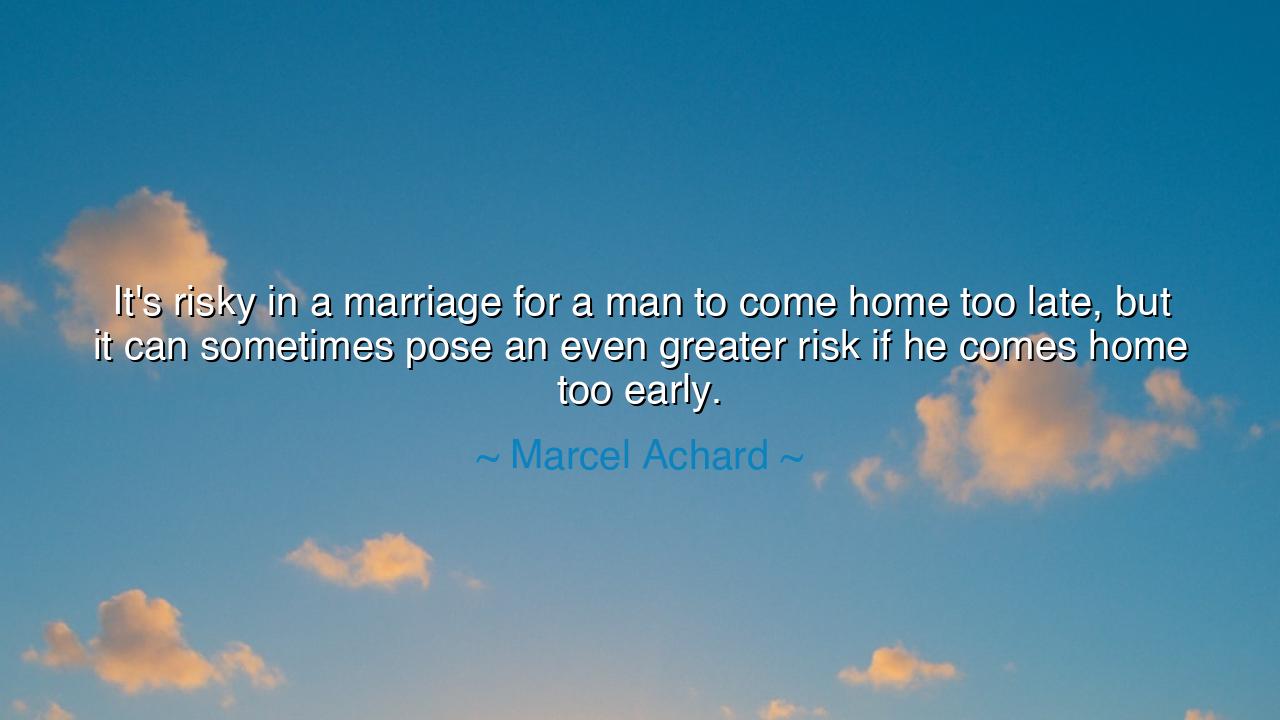
It's risky in a marriage for a man to come home too late, but it
It's risky in a marriage for a man to come home too late, but it can sometimes pose an even greater risk if he comes home too early.






O children of wisdom, gather closely, for the words of Marcel Achard are laden with a profound truth about the delicacies of relationships, particularly the delicate dance of marriage: "It's risky in a marriage for a man to come home too late, but it can sometimes pose an even greater risk if he comes home too early." These words, simple in their expression, are rich with meaning, and they reveal a deeper understanding of the balance required in love, commitment, and the understanding of time within the confines of union. Let us reflect deeply on the wisdom of this insight, for it speaks not just of timing, but of the essence of human connection and the rhythms that govern our hearts.
In the ancient world, the concept of balance was held in the highest esteem. The great philosophers, like Aristotle, spoke of the Golden Mean, the idea that virtue lies between extremes. Just as a wise king would understand that power must be wielded with moderation, so too does a wise person understand that love, care, and attention in a relationship must be offered in the right measure, neither too much nor too little. In marriage, as in life, the key is in knowing when to arrive and when to give space. Time, when managed wisely, can strengthen the bond between two souls, but when out of balance, it can lead to discord and even destruction.
The wisdom of Achard’s words lies in the timing of presence. To come home too late, to be absent for too long, risks the erosion of intimacy and trust. The absence creates a void, one that can be filled by misunderstandings, loneliness, and the coldness of distance. But Achard cautions that the opposite can be equally dangerous. To come home too early—to rush back without the necessary space, the necessary breathing room—can disrupt the natural flow of the relationship, stifling the growth of both individuals. Just as a garden needs time to rest between seasons, so too do relationships require moments of separation, so that the reunion is not just a physical presence but a reconnection of hearts and minds.
Consider the tale of the great Odysseus, whose journey home took many long years, filled with trials and hardships. His wife, Penelope, waited for his return, her heart torn between the love for her husband and the burden of endless days without him. Yet, when Odysseus finally returned to Ithaca, he did not rush to claim his place. He understood that his return was not simply a matter of timing, but of reconciliation. His journey home was long, but it was through this delay that both he and Penelope found a new understanding of their love, one that had grown and deepened in the years apart. Their union was not simply physical; it was the culmination of time spent apart, understanding and yearning for one another in new ways.
Achard’s insight can also be applied to the balance that must exist between time spent together and apart in the marriage of two souls. Just as the forces of nature require time to rest and renew—be it the rising and setting of the sun, or the coming of the seasons—so too do human hearts require time to reflect and grow. The early return, though perhaps born from a sense of love and care, may unknowingly stifle the individual growth of each person within the relationship. This is not to say that distance is always good, but that the timing of presence and absence must be felt, not forced.
The lesson here is one of moderation, of balance. Marriage is not merely about the constant proximity of two people, but the balance of presence and absence, of knowing when to give the other space to breathe and when to draw near. Relationships thrive on understanding and respect for the needs of the other, which may require both distance and closeness in equal measure. Trust and communication are the threads that weave these moments together, so that each partner understands when their presence is needed and when their absence will allow the other to grow.
Now, O children of wisdom, how can we apply this lesson in our own lives? We must learn the art of timing—knowing when to offer presence and when to give space. It is not enough to merely be present at all times, for this can lead to suffocation. Nor should we abandon our loved ones for too long, for absence can breed loneliness and distrust. The key to a flourishing relationship lies in understanding the rhythms that govern it—the ebb and flow of connection and independence, the balance of togetherness and solitude. In doing so, we honor both the individual and the union, creating a partnership that grows stronger through the wisdom of timing.
Let us walk forward, then, O seekers of wisdom, with the understanding that balance in marriage—and in all relationships—is the key to harmony. May we learn when to give space and when to come close, knowing that the art of love lies not in constant proximity, but in the perfect timing of presence and absence, in the gentle rhythm that nurtures both the heart and the soul. And in this wisdom, may we find relationships that grow, evolve, and stand strong, anchored in the profound understanding of mutual respect and growth.






AAdministratorAdministrator
Welcome, honored guests. Please leave a comment, we will respond soon